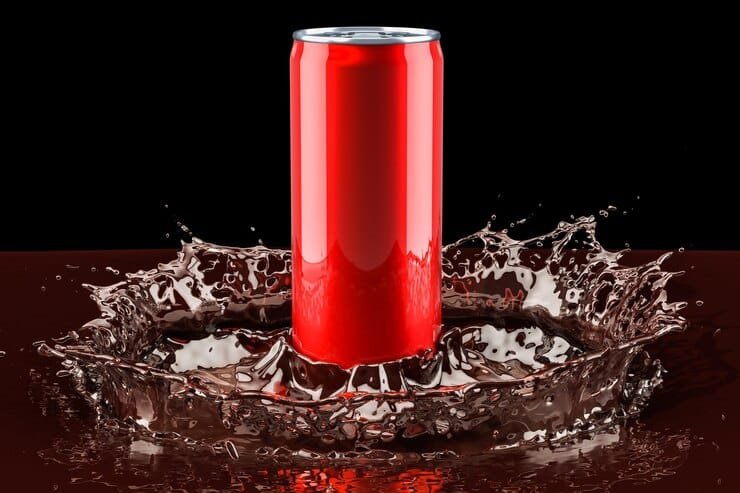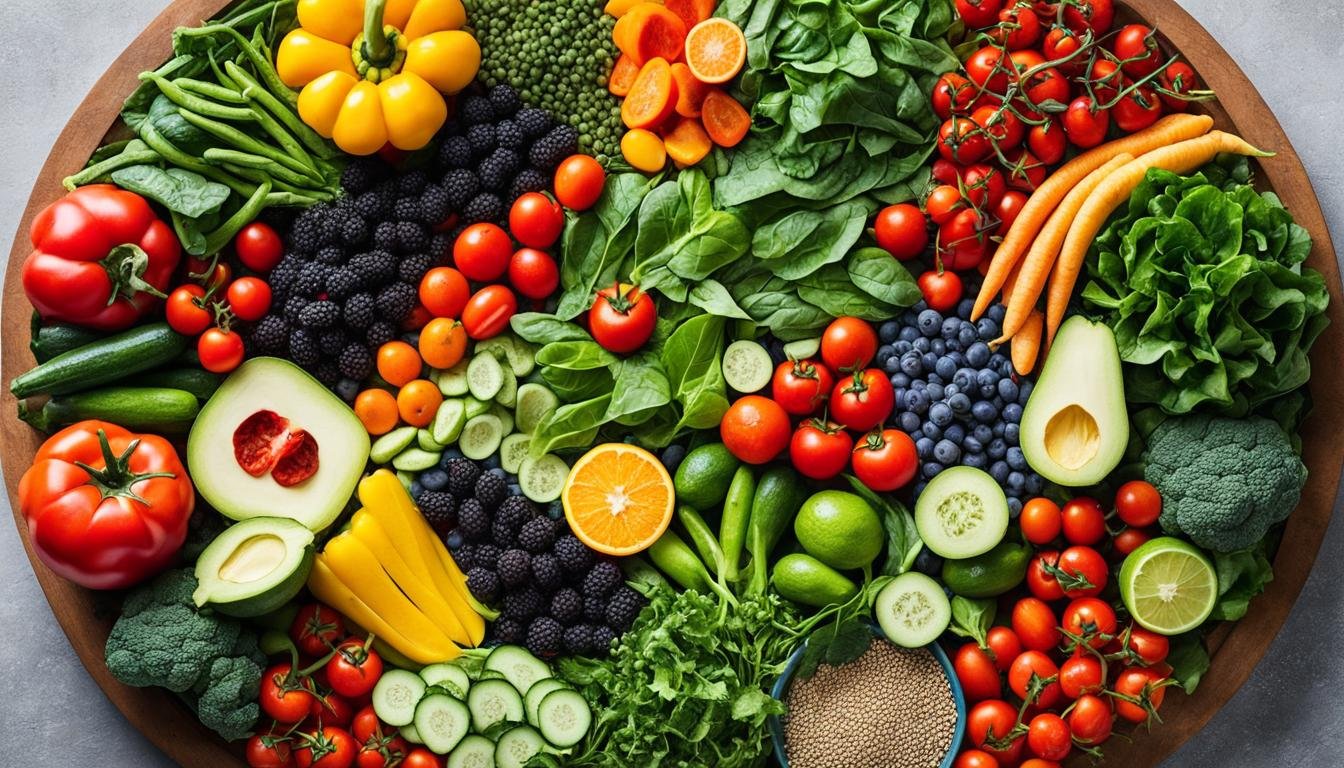According to a study from the American Psychological Association, many individuals in the United States experience emotional and physical fatigue. To combat these feelings of exhaustion, it’s crucial to find ways to boost your energy levels. One popular option is energy drinks, which can provide a quick and convenient energy boost. However, not all energy drinks are created equal. In this guide, we will explore the best energy drinks on the market, their benefits, and how they can help you stay energized throughout the day.
When choosing an energy drink, it’s important to consider the ingredients they contain. Some energy drinks rely heavily on caffeine to provide an energy boost, while others focus on utilizing natural ingredients for a healthier alternative. It’s essential to find the right balance to match your needs, whether you require an energy boost for study sessions or intense workouts.
In addition to energy drinks, we will also discuss the importance of hydration, the role of coffee in boosting energy, the power of smoothies, the benefits of matcha, the impact of fruits and veggies on energy levels, and much more. By incorporating these strategies into your routine, you can experience sustained energy throughout the day and enhance your overall well-being.
Key Takeaways:
- Energy drinks can provide a quick and convenient energy boost, but it’s essential to choose ones with quality ingredients.
- Staying hydrated is crucial for maintaining energy levels, so make sure to drink enough water throughout the day.
- Coffee contains caffeine, which can increase alertness and focus, but it’s important to consume it in moderation.
- Smoothies are a great option for a balanced source of energy, especially when incorporating fruits and vegetables.
- Matcha can improve cognitive function and reduce stress, making it a beneficial addition to your routine.
The Importance of Hydration for Energy Levels
Dehydration can have a significant impact on our energy levels and overall well-being. Studies have shown that even mild dehydration can lead to decreased energy levels, resulting in feelings of fatigue and lethargy.
A study published in the International Journal of Environmental Research and Public Health found that dehydration can cause lower energy levels, mood changes, and difficulties with memory and attention. This highlights the importance of staying properly hydrated throughout the day.
One of the simplest and most effective ways to stay hydrated is by drinking water. Water plays a vital role in our body’s functions, including maintaining energy levels. It helps transport nutrients to our cells, regulates body temperature, and flushes out toxins.
The recommended daily intake of water varies depending on factors such as age, sex, climate, and physical activity level. On average, it is recommended that females aim for 91 ounces (2.7 liters) of water per day, while males should aim for 125 ounces (3.7 liters) of water per day.
“Drinking enough water throughout the day is essential for maintaining optimal energy levels and promoting overall health.”
Having a water bottle nearby as a visual reminder and flavoring water with fruits or infusion packets can make it more enticing to drink and help meet your daily hydration goals.
| The Benefits of Water for Energy Levels | The Importance of Hydration |
|---|---|
| 1. Water supports the proper functioning of cells, organs, and tissues in the body. | 1. Dehydration can cause decreased energy levels and feelings of fatigue. |
| 2. Adequate hydration helps regulate body temperature, preventing overheating and fatigue. | 2. Studies have shown that even mild dehydration can negatively affect mood, memory, and attention. |
| 3. Drinking water improves circulation and helps deliver necessary nutrients and oxygen to the body for optimal energy production. | 3. Proper hydration promotes better physical and cognitive performance, enabling you to stay energized and focused. |
| 4. Water aids in digestion and absorption of nutrients, supporting overall metabolic function and energy production. | 4. Maintaining an appropriate fluid balance is crucial for maintaining overall health and well-being. |
Remember, drinking enough water is key to maintaining optimal energy levels and promoting overall health. By making hydration a priority and ensuring you meet your daily water intake goals, you can support your body’s energy production and enhance your well-being.
The Role of Coffee in Boosting Energy
Coffee has long been a popular choice for those seeking an energy boost. Its rich aroma and bold flavor make it a beloved beverage worldwide. But beyond its enticing taste, coffee contains a key ingredient that plays a significant role in boosting energy levels: caffeine.
Caffeine is a natural stimulant found in coffee beans. When consumed, it acts on the central nervous system, blocking adenosine receptors in the brain. Adenosine is a neurotransmitter that promotes sleepiness and relaxation. By inhibiting its effects, caffeine helps increase alertness and focus, giving you the energy you need to tackle the day ahead.
However, it’s important to consume coffee in moderation and be mindful of the sugar content in your cup. While caffeine can provide a short-term energy boost, excessively sugary coffee beverages can lead to energy crashes and poor overall health. Opting for unsweetened or low-sugar options can help maintain sustained energy levels throughout the day.
The Benefits of Coffee:
- Increased alertness and focus
- Improved cognitive function
- Enhanced physical performance
- Reduction in the risk of certain diseases, such as Parkinson’s disease and type 2 diabetes
- Potential antioxidant benefits
“Coffee contains caffeine, a natural stimulant that helps increase alertness and focus.”
For those looking for sustained energy, it’s important to complement your coffee consumption with a balanced breakfast that includes other sources of macronutrients. Pairing your coffee with a meal rich in protein, healthy fats, and complex carbohydrates can provide a more sustained release of energy throughout the day.
To summarize, coffee, with its caffeine content, serves as a powerful tool for boosting energy levels. However, it’s crucial to consume it in moderation and be mindful of added sugars. By incorporating coffee into a well-rounded diet and healthy lifestyle, you can harness its benefits and enjoy a sustained energy boost.
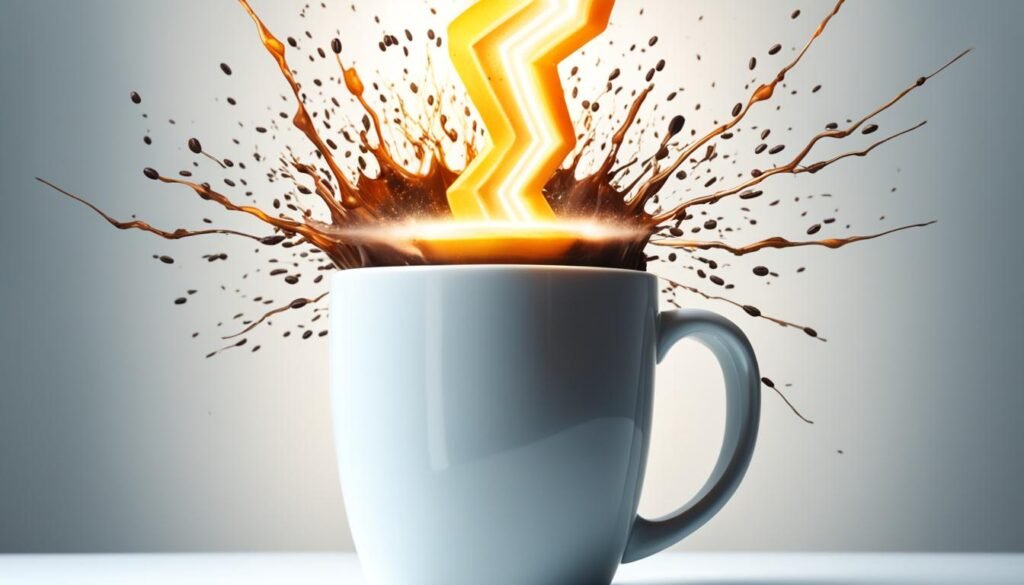
The Power of Smoothies for Energy
Smoothies are a fantastic way to boost your energy levels while providing your body with essential macronutrients, hydration, and a plethora of vitamins. Unlike other drinks, smoothies offer a balanced combination of protein, healthy fats, and carbohydrates, making them a more complete source of energy. By incorporating a variety of fruits and vegetables into your smoothies, you can ensure that you’re getting a good intake of essential nutrients vital for overall well-being.
One of the key benefits of smoothies is their ability to provide hydration. Smoothies are an excellent way to stay hydrated as they are primarily made with liquid bases such as water, coconut water, or almond milk. These hydrating ingredients help replenish fluids and promote better overall energy levels throughout the day.
Moreover, smoothies offer a convenient and delicious way to increase your fruit and vegetable intake. By blending fresh or frozen produce into your smoothies, you can easily reach your recommended daily servings of fruits and vegetables. This ensures that you’re getting a wide range of vitamins, minerals, and antioxidants necessary for optimal energy production and overall health.
However, it’s important to be cautious of smoothies that are high in added sugars, as excessive sugar intake can lead to energy crashes and potential health issues. It’s best to opt for smoothies made with natural ingredients and avoid adding extra sweeteners. This way, you can enjoy the full nutritional benefits of smoothies without compromising your energy levels or overall well-being.
Pro Tip: Try adding leafy greens like spinach or kale to your smoothies for an extra boost of nutrients. These greens are packed with vitamins, minerals, and fiber.
Smoothie Recipe: Energizing Green Machine
| Ingredients | Amount |
|---|---|
| Kale or spinach | 1 cup |
| Banana | 1 |
| Pineapple chunks | 1/2 cup |
| Almond milk | 1 cup |
| Chia seeds | 1 tablespoon |
| Ice cubes | Handful |
Directions:
- Add all the ingredients to a blender.
- Blend until smooth and creamy.
- Pour into a glass and enjoy!
With the right ingredients and a bit of creativity, smoothies can become a powerful tool in boosting your energy levels and maintaining a healthy lifestyle.

The Benefits of Matcha for Cognitive Function
Matcha, a type of green tea, offers numerous benefits for cognitive function and stress relief. It contains catechins, which have been linked to improved brain function and reduced stress levels. A study published in Nutrition Research found that consuming matcha daily for two weeks resulted in enhanced cognitive function, especially during and after stressful conditions.
The catechins found in matcha have been shown to stimulate brain activity and improve concentration and focus. They also have antioxidant properties that protect brain cells from oxidative stress and damage. Matcha’s natural components promote a calm and alert state of mind, reducing anxiety and boosting mental clarity.
One of the advantages of matcha is that it can easily be incorporated into daily routines and prepared in various forms. Matcha can be brewed as a traditional tea, used in smoothies, or added to baked goods and desserts. By opting to brew matcha at home, individuals can have better control over the ingredients, ensuring a healthier and less sugary alternative to matcha drinks from coffee shops.
To fully enjoy the benefits of matcha for cognitive function and stress relief, it is recommended to combine it with a balanced lifestyle that includes a nutritious diet, regular exercise, and sufficient sleep. By incorporating matcha into your routine, you can experience its positive effects on cognitive function and overall well-being.
Why is matcha beneficial for cognitive function and stress relief?
The high concentration of catechins found in matcha provides several advantages for cognitive function and stress relief:
- Enhanced brain function: Matcha’s catechins stimulate brain activity, improving focus, attention, and mental performance.
- Reduced stress levels: Matcha’s natural components promote a sense of calmness and relaxation, reducing anxiety and stress.
- Protection against oxidative stress: Matcha’s antioxidant properties help protect brain cells from oxidative stress and damage caused by free radicals.
Overall, incorporating matcha into your daily routine can contribute to enhanced cognitive function, reduced stress levels, and improved overall well-being.
The Impact of Fruits and Veggies on Energy Levels
Consuming two additional servings of fruits and vegetables has been associated with increased vitality and energy levels. These wholesome foods are packed with essential vitamins, minerals, and antioxidants that play a vital role in maintaining a healthy body and mind.
Fruits and veggies contain a wide variety of nutrients that can improve blood flow to the brain and positively affect the gut microbiome. These benefits contribute to enhanced energy levels and overall well-being.
One particular fruit that stands out in boosting vitality, energy, and mood is kiwi. Kiwis are an excellent source of vitamin C, which helps support the immune system and fight oxidative stress in the body. Additionally, kiwis are rich in dietary fiber and other essential vitamins and minerals.
The Nutritional Value of Kiwi (per 100g)
| Nutrient | Amount |
|---|---|
| Energy | 61 calories |
| Protein | 1.1 grams |
| Fat | 0.5 grams |
| Carbohydrates | 14.7 grams |
| Fiber | 3 grams |
| Vitamin C | 92.7 milligrams |
| Vitamin K | 40.3 micrograms |
| Potassium | 312 milligrams |
With its high vitamin C content, kiwi provides a natural energy boost, supports collagen production, and helps improve iron absorption. It also aids in regulating blood pressure and maintaining cardiovascular health.
Therefore, incorporating more fruits and vegetables into your diet, including kiwi, can contribute to increased vitality, improved energy levels, and enhanced overall health and well-being.
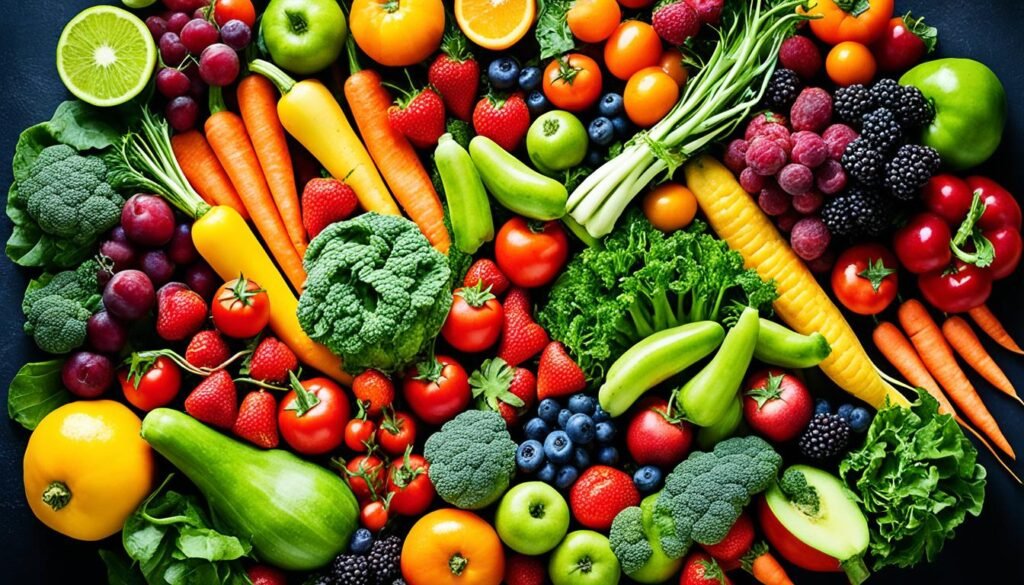
Beet Juice for Exercise Performance
When it comes to enhancing exercise performance, beet juice has emerged as a powerful natural aid. Packed with nitrates, beet juice has been shown to boost nitric oxide production in the body. This, in turn, helps dilate the blood vessels, improving blood flow to the muscles and brain. The increased oxygen delivery to these vital areas can make exercise feel less challenging and improve overall energy levels.
Research has shown that the consumption of beet juice before workouts can lead to significant improvements in performance. A study published in the Journal of Applied Physiology found that cyclists who drank beet juice were able to cycle for longer durations before reaching exhaustion compared to those who consumed a placebo.
The benefits of beet juice are not limited to endurance athletes. Individuals engaging in resistance training can also reap the rewards. A study published in the Journal of the International Society of Sports Nutrition found that men who consumed beet juice before performing resistance exercises experienced increased muscular power output.
It is worth noting that while beet juice is a potent tool for enhancing exercise performance, its taste may not be for everyone. However, considering the numerous benefits it offers, the mild inconvenience of taste becomes a small price to pay.
To harness the benefits of beet juice for exercise performance, it is recommended to consume it around 2-3 hours before your workout. Aim for a serving size of approximately 16 ounces (480 mL) for optimal results.
Beet Juice Dosage Guide
| Body Weight | Beet Juice Amount |
|---|---|
| 120-150 lbs (54-68 kg) | 16 oz (480 mL) |
| 151-200 lbs (69-91 kg) | 20 oz (600 mL) |
| 201+ lbs (91+ kg) | 24 oz (720 mL) |
It’s important to adjust the beet juice dosage based on body weight to ensure optimal nitrate intake.
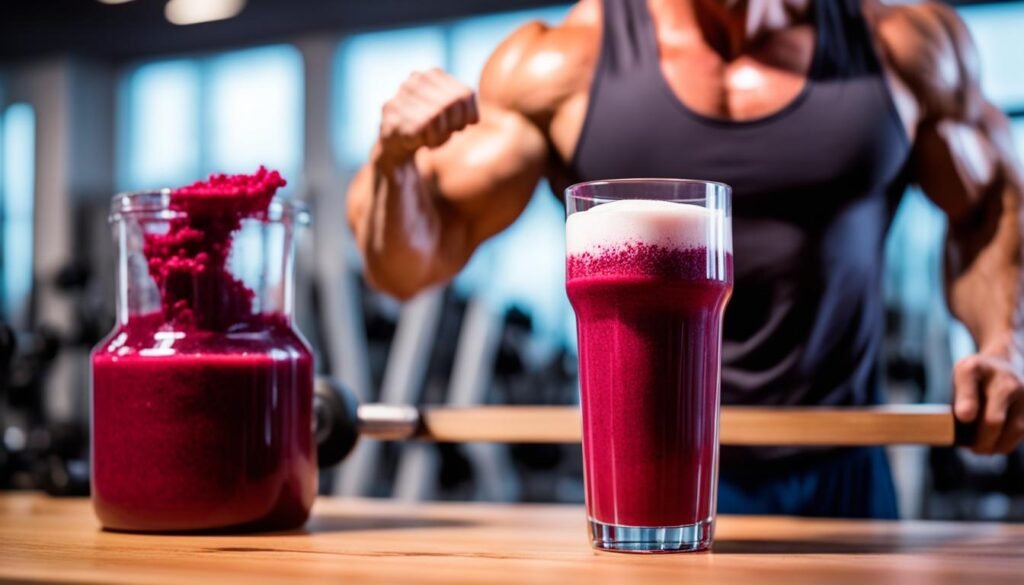
The Role of Sleep and Exercise in Energy Levels
Proper sleep hygiene and regular exercise are crucial for maintaining optimal energy levels. Lack of sleep can lead to fatigue and decreased energy throughout the day, while exercise has been shown to improve fatigue and enhance physical performance.
When it comes to sleep, aiming for the recommended seven-plus hours per night is essential. Sleep deprivation not only affects your energy levels but also impairs cognitive function, mood, and overall well-being. By prioritizing restful sleep, you can wake up feeling refreshed and ready to tackle the day.
Exercise, on the other hand, has numerous benefits for energy levels. It boosts endorphin production, improves circulation, and enhances oxygen delivery to the muscles, leading to increased vitality and alertness. Both aerobic exercises, such as running or swimming, and resistance exercises, like weightlifting, play a role in improving energy levels.
“The best energy booster I’ve found is a combination of sleep and exercise. They work synergistically to keep me energized throughout the day.” – Sarah Thompson, Fitness Enthusiast
Incorporating both aerobic and resistance exercises into your routine is ideal for maximizing the energy-boosting effects. These types of exercises can improve cardiovascular health, increase endurance, and promote better sleep quality. By adopting a well-rounded fitness regimen, you can enhance your physical performance and combat fatigue.

It’s worth noting that the timing of exercise can also impact energy levels. Engaging in physical activity earlier in the day can promote a sense of wakefulness and prevent sleep disruption at night. However, everyone’s preferences and schedules may differ, so finding a routine that works best for you is key.
Here’s a breakdown of the benefits of sleep and exercise on energy levels:
| Benefits of Sleep | Benefits of Exercise |
|---|---|
| Restores energy levels | Boosts endorphin production |
| Enhances cognitive function | Improves circulation |
| Improves mood and well-being | Increases oxygen delivery to muscles |
| Reduces fatigue | Enhances physical performance |
By prioritizing quality sleep and incorporating regular exercise into your lifestyle, you can experience improved energy levels, reduced fatigue, and enhanced overall performance.
Managing Caffeine Intake for Sustained Energy
While caffeine can provide an energy boost, it’s important to manage your caffeine intake to avoid dependence and energy crashes. Everyone’s caffeine sensitivity is different, but relying too heavily on caffeine in the morning can lead to poor sleep and the need for even more caffeine the next day. It’s recommended to gradually reduce caffeine intake and substitute it with flavored seltzer waters or herbal teas as alternatives.
Excessive caffeine consumption can lead to jitters, increased heart rate, and disrupted sleep patterns. To prevent these side effects and maintain a healthy energy level throughout the day, it’s essential to find a balance with caffeine intake. Gradually reducing the amount of caffeine you consume can help your body adjust and prevent withdrawal symptoms.
Flavored seltzer water is an excellent option for those looking to cut back on caffeine without sacrificing taste. These sparkling waters come in a variety of flavors and can provide a refreshing alternative to caffeinated beverages. They are a great way to stay hydrated and add some flavor to your day. Some popular brands of flavored seltzer water include LaCroix, bubly, and Spindrift.
Herbal teas are another great option for those looking to reduce caffeine intake. Herbal teas are naturally caffeine-free and can offer a wide range of flavors and benefits. Some herbal teas, such as chamomile and peppermint, have calming properties, making them an excellent choice for relaxation and stress relief. Other herbal teas, like ginger and ginseng, can help boost energy levels and improve focus.
To effectively manage your caffeine intake, consider incorporating these alternatives into your daily routine. Gradually reduce caffeine consumption by replacing one caffeinated beverage with a flavored seltzer water or herbal tea. Over time, you can continue to decrease your caffeine intake until you reach a level that works best for your body and energy needs.
“Finding the right balance with caffeine intake is essential for maintaining sustained energy levels without the negative side effects. Gradually reducing caffeine consumption and substituting it with flavored seltzer waters or herbal teas can help individuals avoid energy crashes and dependence on caffeine.”
The Best Drinks for Sustained Energy Levels
When it comes to maintaining sustained energy levels throughout the day, the best beverage choice is water. Proper hydration is essential for supporting various bodily functions and keeping your energy levels up. While energy drinks, like the ones mentioned in this article, can provide a temporary energy boost, they should not be relied upon as the sole source of hydration.
Water should be consumed regularly alongside these energy drinks to ensure optimal hydration and sustained energy. Drinking an adequate amount of water not only helps to replenish fluids lost through sweat and other bodily functions but also aids in digestion, circulation, and overall body functioning.
As a general guideline, it is recommended to drink at least eight glasses of water per day, but individual needs may vary depending on factors such as activity level, climate, and overall health. It’s important to listen to your body’s cues for thirst and drink water accordingly.
“Water is the driving force of all nature.” – Leonardo da Vinci
In addition to water, some other drinks can also contribute to your sustained energy levels. Here are a few examples:
Green Tea
Green tea contains natural compounds such as caffeine and L-theanine, which can provide a gentle and sustained energy boost. It is also rich in antioxidants, promoting overall health and well-being. To make the most of its benefits, brew your own green tea at home using high-quality tea leaves.
Herbal Teas
Herbal teas, such as chamomile, peppermint, or ginger, can be a great alternative to energy drinks. These teas are caffeine-free and often have calming properties that can help relieve stress and improve focus.
Infused Water
Infusing water with fruits, vegetables, or herbs can add a burst of flavor and encourage you to drink more water throughout the day. Try adding slices of lemon, cucumber, or mint leaves to your water for a refreshing twist.
Coconut Water
Coconut water is a natural source of hydration that contains electrolytes and minerals, making it an excellent choice for replenishing fluids. It can provide a subtle energy boost while keeping you hydrated.
Also Read:- Best Sugar-Free Energy Drinks For Healthy Boost
Remember, while these alternative drinks can contribute to sustained energy levels, water should still be your primary hydration source. Aim to drink water consistently throughout the day and incorporate these other options when desired.
Stay hydrated, energized, and enjoy the benefits of sustained energy throughout your day!
Conclusion
In conclusion, when it comes to finding the best energy drink for your needs, it is important to consider factors such as ingredients, taste, and overall quality. Throughout this article, we have discussed some of the top energy drinks available on the market, including CELSIUS, C4, Pureboost, ZOA, and RYSE Fuel.
Each of these drinks offers a range of options with different benefits to suit various preferences. Whether you are looking for a caffeine boost, natural ingredients, or specific flavors, there is likely an energy drink on this list that meets your requirements.
However, it is important to remember that energy drinks should not be relied upon as a sole source of hydration. Staying hydrated, getting enough sleep, and incorporating a balanced diet and exercise routine are all essential for maintaining optimal energy levels throughout the day.
FAQs
Q: What is the healthiest energy drink?
A: The healthiest energy drink is often considered to be one that is low in sugar, calories, and artificial ingredients. Some popular options include brands like Celsius, 5-hour Energy, and Bang Energy.
Q: How much caffeine is in a typical energy drink?
A: A typical energy drink can contain anywhere between 70-200 milligrams of caffeine per serving, which is equivalent to about two cups of coffee.
Q: What are some healthy alternatives to traditional energy drinks?
A: Some healthy alternatives to traditional energy drinks include natural options like green tea, matcha, and beverages containing B-vitamins for a natural energy boost.
Q: What are the main ingredients to look for in a healthy energy drink?
A: When seeking a healthy energy drink, it’s important to look for ingredients like B-vitamins, natural caffeine sources, and minimal added sugar or artificial sweeteners.
Q: What is Taurine and why is it often found in energy drinks?
A: Taurine is an amino acid that is often included in energy drinks for its reported role in boosting energy levels and improving athletic performance.
Q: How do popular energy drink brands like Red Bull and Monster compare in terms of healthiness?
A: Red Bull and Monster are both popular energy drink choices, but they are often high in sugar and caffeine. When looking for a healthier option, consider brands like Celsius or 5-hour Energy.
Q: Is it safe to consume multiple energy drinks in a day?
A: Consuming multiple energy drinks in a day can lead to consuming excessive amounts of caffeine, which may lead to side effects like increased heart rate, high blood pressure, and difficulty sleeping. It’s important to moderate consumption and be aware of your caffeine intake from all sources.
